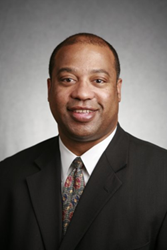A Trait For Quailty In John McKay's DNA
By Louis Garguilo, Chief Editor, Outsourced Pharma

Panelist: John McKay, Senior Vice President, Global Quality & Corporate Compliance Officer at CTI BioPharma
Panel: Qualifying CDMO Capabilities & Benchmarking Your CDMOs Performance, Establishing And Managing A Balanced Quality Agreement
If you string together some of John McKay’s qualifications, they form what looks something like a strand of DNA from a new life form: CMQCQAQMS. And this particular gene would express a single trait: McKay knows quality like few others.
Specifically, he knows how quality should be applied to the pharma outsourcing industry, and how the quality agreement needs to effectively bind and define the sponsor-provider relationship.
McKay, currently Senior Vice President, Global Quality & Corporate Compliance Officer, CTI BioPharma, will be one of the leaders on the panel “Establishing and Managing a Balanced Quality Agreement” at the Outsourced Pharma West conference in San Francisco, November 10-11.
“Throughout my career, I’ve seen outsourcing from engineering, operations, supply chain management, research and development, and other perspectives as they relate to quality management,” says McKay. “I’ve been in charge of contract manufacturing for large pharma, biotech, and medical device companies,” he adds, referring to his years at Rohm and Haas, and Bayer.
“One of the keys is to make sure there is a good fit between what you need provided and the outsourcer actually provides—with few exceptions, you want to be directly in their service sweet-spot,” he says.
How do you find that most perfect provider, especially when there can be so much and, at times, conflicting advice?
McKay says it’s good policy to start with those companies who are actively out there marketing and branding themselves. He also stresses ISO 9001 certification, and companies who have been recognized with awards from organizations. “People get all kinds of advice,” he says. “Mine is for you to go to conferences like Outsourced Pharma West. You need to meet and talk to the CMOs and CDMOs, review their credentials. Just like going to Walmart, it’s instructive to see the offerings lined up in one place. I think you’ll find the most reputable, customer-centered providers with the best quality are those who attend these conferences.”
From Who to How
Once you’ve identified your provider, the work to put together a quality agreement follows closely. McKay has a memorable way of thinking about this document and timing.
“It’s like completing a pre-nuptial agreement,” he says. “It should be honest and open, a win-win, and must include all the things that are important to both sides.”
The place to start looking for a template might be your own company: Do you have some historic agreements you can utilize? “Some experienced biotechs and pharma companies,” he says, “have a deck of quality agreement templates to use for the different services they outsource.”
However, according to McKay, often the best place for an inexperienced company to start is with the provider. Unfortunately, those new to outsourcing often have reservations, if not a certain mistrust of this option.
“But really,” he says, “some of the best quality agreements come directly from the CMOs and CDMOs themselves. After all, they do hundreds of these agreements, and if they didn’t work out, they would lose customers. Don’t be afraid to ask for their template and use it as a draft or basis to move forward.”
Two Points For Consideration
McKay’s first caution relates to the debate about just how much detail needs to go into a quality agreement. “Sometimes there is pushback, either internally or externally, for not being excessively detailed in in the quality agreement,” he says. “My experience, though, is that you always want to have as much detail in the agreement as possible. You do not want to take anything for granted.” And here is the main reason: “If debates or disagreements come up on just about anything, the first place people are going to turn to is the quality agreement you put together.”
The second subject is perhaps more of a reminder than a caution. McKay says the quality agreement should “evolve as the relationship evolves.” When I ask him about that, he replies it is similar to an insurance policy for your cars. “You add cars, drivers, change driving habits, get new or different types of vehicles. The quality agreement is your insurance policy for your projects and outsourced services,” he says.
The Highest Qualification
I ask McKay, semi-seriously, if he had to pick one of his many certifications, which would be most significant to him. “If I had to, I would say the ASQ CMQ/OE - Certified Manager of Quality/Organizational Excellence,” he says. “It’s the highest certification attainable from the American Society for Quality.”
“I am excited and humbled to be a part of the Outsourced Pharma West conference in November, so I can share some of what I’ve learned with others,” he says, and then graciously adds, “I’ve seen the leadership provided by the Life Science Connect media group. I’m impressed by how Life Science Leader covers the industry, so I look forward to this event you’re sponsoring directly. I’m prepared to add a lot of value.”
For our part, here’s hoping, metaphorically at least, we can inherit some of John McKay’s Quality DNA.
(Editor’s Note: John McKay’s opinions are his own and may not necessarily represent his company’s position.)
